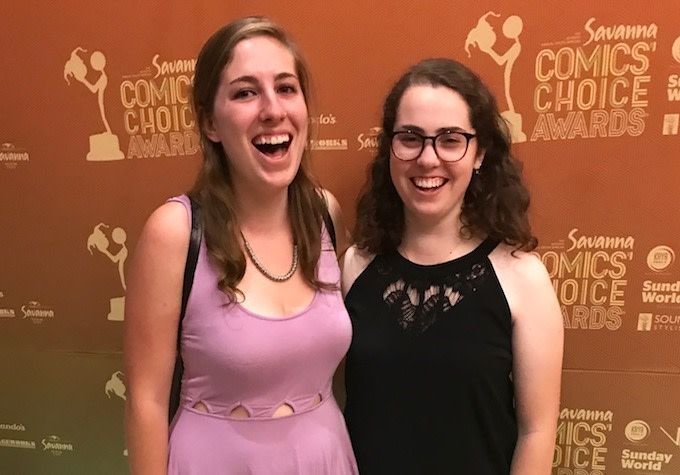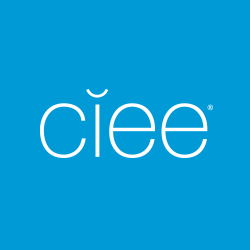Two CIEE Study Abroad Alumni Make Documentary About South African Comedy
The Alumni of the Month for November are Hannah Rafkin and Meg Robbins, CIEE Study Abroad alumni and recent Bowdoin College graduates who studied in Cape Town, South Africa in 2015. After an amazing experience abroad, the two friends fantasized about returning to Cape Town in a meaningful way. Two years later, they are back in South Africa, working on a documentary about the stand-up comedy scene and how it’s bringing new means of expression for speakers of lesser-known languages in the country. We interviewed them to learn more about their exciting documentary and how study abroad inspired the project:
What attracted you to Cape Town?
We both attended Bowdoin College in Brunswick, Maine – a small liberal arts school of 1,800 students. The University of Cape Town (UCT) is a large research university in a major city, so we were excited to experience pretty much the polar opposite of what we were used to. We also both majored in English and wanted an opportunity to study non-European and non-American literature written in English. Beyond that, we were obviously attracted by the beauty of the city. The city/mountain/ocean combination definitely appealed to us. But that was an added benefit –we were definitely looking to broaden our perspectives and learn about the history and the current challenges South Africa faces. We wanted to have conversations that we wouldn’t ordinarily have at Bowdoin, or any other place for that matter.
What did learning abroad offer that you could not have received on campus?
The most powerful learning experiences we had in Cape Town were not in the classroom. We were lucky enough to experience the start of the #FeesMustFall campaign, a student-led protest that took South Africa’s universities by storm and has continued to evolve since. UCT students organized to demand their right to free education and to protest the treatment of black students and workers. This movement was literally unfolding at our doorstep. One of our resident advisors was arrested for peacefully protesting and spent the night in jail. Students held posters with slogans that their parents’ generation used in anti-apartheid protests. Our finals ended up getting delayed, but it was absolutely worth it to be immersed in this political moment. Witnessing political action and dialogue on such a high level was a unique experience that we knew we’d never get in Brunswick, Maine.
About the project:
As longtime comedy fans, we watched a lot of stand-up while we were in Cape Town. It was exciting to listen to comedians responding to current events and the historical context of South Africa. At this time, Trevor Noah was just starting to take over for Jon Stewart on The Daily Show, so that became a frequent point of connection between us and South Africans we’d meet. We had a lot of discussions with South Africans about the role of comedy in confronting political corruption and difficult histories, and these talks got us thinking more deeply about the comedy occurring in our own nation.
After returning to Bowdoin, we continued having these conversations, and we were constantly itching to get back to South Africa in a meaningful way. Halfway through our senior year, President Trump was inaugurated. As our country was delving into chaos, the comedy was getting very, very good. People were turning to SNL, Stephen Colbert, Trevor Noah, and Samantha Bee. We were deep in thought about this relationship between politics and comedy and kept returning to discussions about how this relationship works in South Africa. One night during one of these talks, the idea for our documentary clicked. We stayed up until 5 a.m. planning and researching – we knew we were hitting on something important and wanted to make it happen.
As we continued to research and talk to South African comedians, we realized that vernacular comedy was the most fascinating genre growing in South African comedy. That’s what we decided to focus on. Vernacular comedy is doubly political – the material confronts messy politics while the medium of mother tongue languages is itself a political protest against the dominance of English and Afrikaans.
What is it like to experience South African comedy?
South African comedy is a huge umbrella term for a variety of performance styles, languages, venues, and themes. Running through them all is an intense energy between the performers and their audience – comedians often repeat to their audiences that comedy works with energy.
We’ve obviously been going to a lot of vernacular comedy shows, and we often get asked what it’s like to experience those gigs when we don’t speak any of the nine indigenous languages that make up the ‘vernacular’ genre. Of course it can be frustrating at times to not understand everything that’s said, but the combination of the palpable energy in the room during these shows and the way the comedians use other linguistic cues and body language – tone of voice, volume, facial expression, hand movements, an English phrase here and there – enables you to sort of pick up on parts of what is going on. You can feel when something is hilarious even if you don’t understand exactly what that is. And sometimes you realize you don’t need a word-for-word translation. We’ve been able to talk to a lot of comedians about their jokes in English. They won’t translate them for us word for word, but they’ll explain the premises. For instance, one of the comics in our film does a joke about his grandfather who still thinks South Africa is under apartheid. Knowing that bit of background and then seeing the audience react as the comedian performs is enough for us to feel like we experienced his set in a meaningful way.
How is comedy challenging the status quo?
In South Africa, stand up has only been a viable art form since the nation became a democracy in 1994 (with the exception of a few white men who performed under apartheid). Since then, it served as a change-maker, a conversation-starter, and a healing tool. In dealing with such a traumatic history and its continuing legacy (South Africa has been rated one of the most unequal nations in the world), laughter has been crucial.
There have been multiple waves of change in post-apartheid comedy. In the early years after 1994, black and coloured comedians began taking the stage for the first time. In more recent years, there has been a surge of female comedians. Now, vernacular comedy – where comics perform in their native language(s) – is the next frontier. This is disrupting the status quo for an obvious reason: the status quo has always been English and Afrikaans.
There are eleven national languages in South Africa, and the majority of its citizens speak some combination of the nine indigenous African languages (Ndebele, Northern Sotho, Sotho, Swazi, Tsonga, Tswana, Venda, Xhosa and Zulu). However, English and Afrikaans have remained dominant. It is no coincidence that these were the two official languages under apartheid. The nine indigenous languages are often relegated to the domestic sphere, and are not as well-represented in entertainment, commerce, and public life. But now, comedians are taking to the stage and speaking in their mother tongues as a form of empowerment. By putting these languages in the spotlight, they are amplifying the stories, perspectives and cultures of South Africa’s majority. Vernacular comedy is bringing value to mother tongue languages outside of the domestic sphere, and in turn is helping shape how the languages will be spoken in the future.
What impact has vernacular comedy had?
Though formalized stand-up comedy is a recent phenomenon, humor and storytelling are by no means new in South Africa. But now, vernacular comics are making a living doing this. They are performing sold out shows in front of massive audiences without having to conform to industry pressures to speak English or to discuss certain topics.
As evidenced by enormous fan followings, consistently sold-out events, and booming laughter, South African audiences are ready to see their linguistic diversity represented onstage. We’ve even observed this at ‘English’ comedy shows. A comic will go through the whole arc of a joke in English, and then suddenly crack the punchline in Zulu or Xhosa – the audience explodes.
Comedians and audience members alike often describe comedy as a healing tool – a powerful means of grappling with both personal and political trauma. Vernacular comedians in particular stress the importance of relating to their audiences; they seek to provide them with stories and jokes that are relevant to their daily lives. In a country that has historically shunned the life experiences of its majority, this laughter and connection is especially important.
Learn more about the documentary by watching the video below and visiting their Indiegogo page, where you have the chance to donate to this incredible project!

